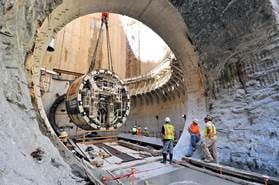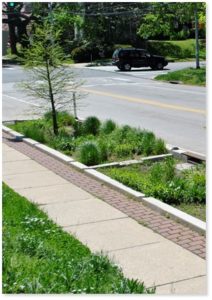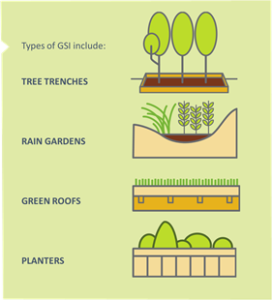A Tool for a Thriving, Equitable, and Climate Resilient Local Economy
by Anna Shipp, Executive Director, Sustainable Business Network of Greater Philadelphia
Our current economic downturn caused by COVID-19 and ongoing social and climate crisis demands a transformational change in everything from business practices to public policy, including how we approach stormwater management. In rebuilding our economy, the government must prioritize green stormwater infrastructure because it’s a tool that fosters job growth, public health, community well-being, and resiliency.
Because of the complicated relationship between our economy, social equity, and climate we must measure success by all three levels. Applying this resilience lens leads to better-designed policies and projects that address multiple challenges at one time, thus ensuring that every dollar is spent in a way that maximizes the social, environmental, and economic benefits while minimizing future risk.
Philadelphia’s approach to stormwater management offers a great example. In 2011, Philadelphia began implementing Green City, Clean Waters, a 25-year plan to meet regulations related to combined sewer overflows. What makes this plan unique is a combination of its scale and innovation. The City of Philadelphia’s investment has been estimated to be anywhere from $1.2 billion to $3 billion over the plan’s lifespan and remains the country’s first and only plan to use green stormwater infrastructure (GSI) as the primary tool for regulatory compliance.

Sewage tunnels are incredibly large and expensive to install.
“Modern” stormwater management has been centralized, accomplished with enormous tunnels, which are often thirty to forty feet in diameter. These tunnels are incredibly expensive, can take decades to complete, and don’t do much beyond managing stormwater. Philadelphia’s Water Department (PWD) promised a more elegant approach with Green City, Clean Waters. Instead of adding more concrete to solve a problem caused by too much concrete, PWD’s plan works to engineer the natural water cycle back into the city through nature-based solutions to stormwater.
Green stormwater infrastructure (GSI) are decentralized soil-and-plant systems that intercept and manage wet weather, which in turn helps to minimize combined and separate sewer overflows. It’s also far more affordable than centralized tunnels while offering a wide menu of economic, social, and environmental benefits. Ecologists and landcare professionals are deeply aware of the environmental benefits of nature, such as air and water quality, so we’ll focus here on the social and economic benefits of a comprehensive nature-based approach to stormwater management.
Social Benefits

Young people enjoy playing in a newly created green space. Photo courtesy of PWD.
GSI provides immense social benefits. In Philadelphia, because GSI is decentralized and thus distributed infrastructure, it is in every neighborhood. Of the public projects led by PWD, 85 projects have created new or improved public open spaces such as parks, playgrounds, and schoolyards in low- to moderate-income communities, predominantly communities of color. Research consistently shows that access to parks and green spaces for recreation reduces chronic disease and stress rates while also improving mental health and function. Leveraging GSI to create new or improved public open spaces can improve physical and mental health equity.
Additionally, research also shows that GSI can reduce crime by 10% within a quarter-mile radius. For narcotics crimes, in particular, the decrease can be upwards of 18-27%. Crime generates costs for the victim, perpetrator, families, government, and society, including tangible costs such as medical expenses, property loss and damage, missed work, police and criminal justice costs, and reduced economic potential. Intangible costs include pain and suffering, which are harder to quantify but not negligible. Crime disproportionately impacts low-income communities and communities of color, so GSI offers an essential tool for equitably advancing public health and safety.

Plantings in the public curb strip between the sidewalk and the road absorb and slow rainwater while also providing visual interest. Photo courtesy of PDW.
Some neighborhoods in urban areas like Philadelphia also experience the heat island effect, meaning temperatures are significantly warmer than those in surrounding areas, primarily due to a lack of vegetated land surfaces. For example, some Philadelphia neighborhoods have recorded temperatures more than 20 degrees hotter than the city-wide average. These neighborhoods are predominately low-income communities and communities of color. Urban heat island effect disproportionally puts these already vulnerable communities at a higher risk of dangerous heat-related health impacts.
Urban heat islands require homeowners and businesses to increase their use of cooling mechanisms such as air conditioners, leading to increased energy consumption and subsequent air pollution and greenhouse gas emissions. Homes and businesses that cannot afford or do not have access to air conditioners are at a higher risk of heat-related health impacts. Heat islands also raise the temperature of stormwater runoff, causing stress and fatalities for aquatic life. Comprehensive public and private investments in GSI help these communities benefit from new and improved green and open spaces, which help bring temperatures down and offer another example of how GSI is an important tool for equitably advancing public health and safety.
Economic Benefits

Sustainable Business Network economic impact report.
There are many economic benefits of GSI. Projects involve planning, design, construction, material supply, maintenance, and occasionally monitoring. These activities are difficult to outsource, meaning they offer significant opportunities for local businesses. Research shows that local spending circulates a dollar three (3) more times in the local economy than non-local spending. Rephrased, purchasing from a local independent business results in a 300% higher local economic impact than buying from a chain store.
This local multiplier effect is because, in an inter-connected economy, every dollar spent generates two spillover impacts. First, a proportion of the direct spending goes towards purchasing goods and services, thus circulating back into the economy when those goods and services are purchased from local vendors. Second, a proportion of the direct spending goes towards labor income, thus circulating back into the economy when those employees spend their earnings on various goods and services locally.
Doing the math for these direct, indirect, and induced economic impacts for Philadelphia’s estimated investment in GSI from 2011 through 2036, Philadelphia can expect to benefit from nearly 1200 jobs annually for 25 years (or 29,000 job-years) and $4 billion in economic activity.
That is just the tip of the iceberg on the proven ways that GSI provides social, environmental, and economic benefits to communities. Imagine all the benefits cities, regions, and states could see if all public and private stormwater management efforts centered GSI the way that Philadelphia does. Let’s use GSI as the tool it is to rebuild our economy with equity and climate resilience.
About the Sustainable Business Network of Greater Philadelphia
The Sustainable Business Network of Greater Philadelphia is building a just, green, and thriving economy in the region. We empower the local business community to be change agents in the movement towards equity and climate resilience; and advocate with them and on their behalf so an equitable and climate resilient local economy grows and thrives.
Our members are independent businesses based in Greater Philadelphia that practice – and measure success by – the triple bottom line of people, planet, and profitability. Geared towards local business leaders, SBN’s programming facilitates honest and supportive discussions among peers and provides important opportunities for civic dialogue.
Since our founding in 2001, SBN has remained the region’s only membership and advocacy organization playing the critical role of serving Greater Philadelphia’s independent triple bottom line business community.
About the Green Stormwater Infrastructure (GSI) Partners
The GSI Partners, a signature initiative of the Sustainable Business Network of Greater Philadelphia (SBN), is a network of local businesses in the green stormwater infrastructure industry. Through this initiative, SBN is working to grow the local GSI industry and advance innovation.
About the Author
Anna Shipp is the Executive Director of the Sustainable Business Network of Greater Philadelphia. She has dedicated her career to social and economic equality and climate resilience. Prior to SBN, Anna worked with opportunity youth, empowering them through important educational, recreational, and career-building opportunities. She also worked with people experiencing chronic unemployment or underemployment, providing them with the resources they needed to overcome barriers and regain financial independence.
***
Each author appearing herein retains original copyright. Right to reproduce or disseminate all material herein, including to Columbia University Library’s CAUSEWAY Project, is otherwise reserved by ELA. Please contact ELA for permission to reprint.
Mention of products is not intended to constitute endorsement. Opinions expressed in this newsletter article do not necessarily represent those of ELA’s directors, staff, or members.

